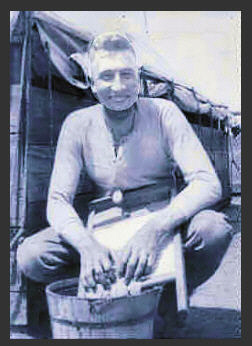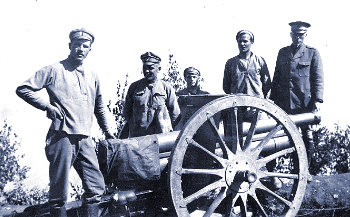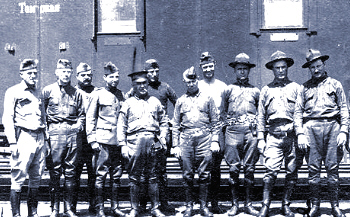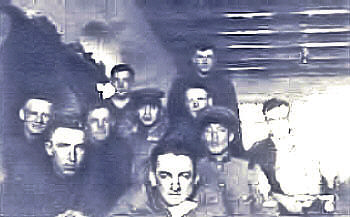Harry Hoyman at Camp Fremont, CA
Imagine a typical World War I action movie that starts out as usual with the boys going through boot camp under a tough old sergeant before heading overseas to meet their fates on the battlefields. About about a third of the way through the film, the drill instructor comes into the barracks and says, "Pack up men, we're heading overseas." Then one of the new soldiers asks, "When are we getting to France, Sarge?" In one authentic version of this movie (yet to be made) the old NCO turns to the young trooper and says, "Son, we ain't going to France; we're going to Siberia."
Members of the Czech Legion in Siberia
Something like this actually happened to some American soldiers in the Great War. One of those Doughboys was a draftee from Freeport, Illinois, named Harry Hoyman (1892-1989). Harry was training with the 8th Infantry of the new 8th Division at Camp Fremont, California, when his orders came down. For reasons that are still unfathomable today, President Wilson authorized U.S. soldiers be sent to northern Russia and Siberia when the post-revolution civil war was being waged there. Apparently, it had something to do with Czech Legionnaires, guarding the Trans-Siberian Railroad, or keeping an eye on what the Japanese Army was up to. Harry and his mates in the Siberian Expeditionary Force never quite understood, and it has gotten much cloudier in concept after nearly a century. We won't pursue the matter here.
American Soldiers Guarding the Railroads
Nonetheless, the Americans in Siberia faced similar dangers, survived comparable adventures, and dealt with the same tedium as those on the Western Front. Plus, they were a lot colder. Harry Hoyman was a little older and more experienced than his mates, and grasped that he gotten himself involved in a unique venture. He photographed and recorded the mission to Siberia and eventually self-published his material in 1972 in what was, for a time, a forgotten manuscript titled My Year in Siberia. Luckily for us, a member of the Great War Society—from the same county as Harry, Stephenson County, Illinois—Alice Horner is a dedicated genealogist. She took on the mission to ensure that the county's men who had served in the war were not to be forgotten. Alice brought Harry's service and memoir to our attention several years ago and we have made selections from Harry's volume available online at:
After the war, Harry returned to Freeport. He worked during his career as an accountant with the Ford Motor Company and as an office manager for the Schacht-Tuck Company. He also regularly attended reunions with his fellow Siberia veterans and relived the great adventure of his life.





My father was also there at that time.
ReplyDeleteHe was in 31st infantry,1918-1919 in Siberia.jack greene
ReplyDeleteJack - We hope that singling out a few of the veterans we will help people remember all of them. Mike
ReplyDeleteMike,He hated it over there.Didn't trust any others,never knew if they would turn on us.Did not like the Russkies.Our troops were worried that they would be abandoned by our gov't,an American ship was hardly ever seen.really happy to get out 0f there.From there he and the 31st wenton to the Fillipenes.(pardon spelling)
DeleteInteresting comments above. My father also was among the troops shipped from Corregidor (Philippines) to Siberia and back. He was in the Signal Corps initially and then transferred to Medical Corps. He never spoke much about his Siberia experience(s), but he certainly enjoyed his time in the Philippines (as attested by the photos and letters in his personal files). Oddly, I did not find any letters home from Siberia. Does any family have a cache of letters from Siberia vets? If so, I would like to access them as part of research on this lesser known incursion.
ReplyDelete